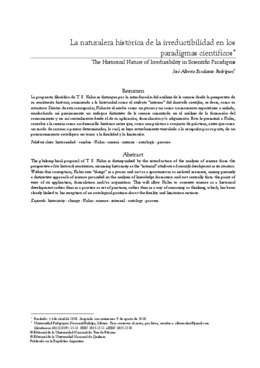La naturaleza histórica de la irreductibilidad en los paradigmas científicos
The historical nature of irreducibility in scientific paradigms
Abstract
La propuesta filosófica de T. S. Kuhn se distingue por la introducción del análisis de la ciencia desde la perspectiva de su constitución histórica, asumiendo a la historicidad como el atributo “interno” del desarrollo científico, es decir, como su estructura. Dentro de esta concepción, Kuhn ve el cambio como un proceso y no como un momento espontáneo o aislado, enarbolando así precisamente un enfoque distintivo de la ciencia cimentado en el análisis de la formación del conocimiento y no así centralmente desde el de su aplicación, formulación y/o adquisición. Esto le permitirá a Kuhn, concebir a la ciencia como un desarrollo histórico antes que, como una práctica o conjunto de prácticas, antes que como un modo de razonar o pensar determinados, lo cual, se haya estrechamente vinculado a la recepción por su parte, de un posicionamiento ontológico en torno a la finalidad y la limitación. The philosophical proposal of T. S. Kuhn is distinguished by the introduction of the analysis of science from the perspective of its historical constitution, assuming historicity as the "internal" attribute of scientific development as its structure. Within this conception, Kuhn sees “change” as a process and not as a spontaneous or isolated moment, raising precisely a distinctive approach of science grounded in the analysis of knowledge formation and not centrally from the point of view of its application, formulation and/or acquisition. This will allow Kuhn to conceive science as a historical development rather than as a practice or set of practices, rather than as a way of reasoning or thinking, which, has been closely linked to his reception of an ontological position about the finality and limitation notions.

